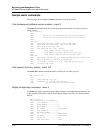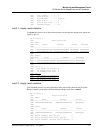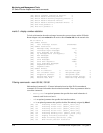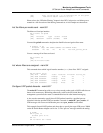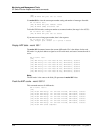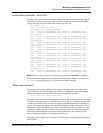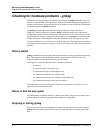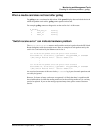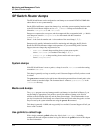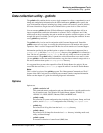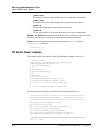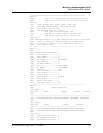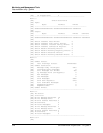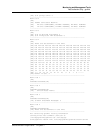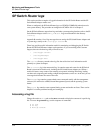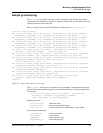
3-24 October 22, 1999 SP Switch Router Adapter Guide - 1.4 Update 2
Monitoring and Management Tools
SP Switch Router dumps
SP Switch Router dumps
The SP Switch Router can be configured to send dumps to an external PCMCIA 520MB disk
rather than to its own system memory.
On the SP Switch Router, output from dumps, logs, and other system reporting functions refer
to the SP Switch Router Adapter card as DEV1_v1 or dev1. Dumps are maintained in the
directories /var/portcards and /var/crash.
Dumps are compressed to save space, and the compressed files are appended with .gz. Media
card dumps are stored in /var/portcards in a file named with the convention
grdump.n.x.gz
where n is the card slot number and x is the number of the saved dump, 1, 2, 3....
Dumps provide specific information useful for monitoring and debugging the SP Switch
Router and SP Switch Router Adapter card operations. If you are working with Customer
Support, these are dumps they might need to see:
– bsdx.core - a kernel dump resulting from a system reset or panic,
sent to /var/crash (x is number of the dump, 1, 2, 3...)
– grdump.n.x.gz - a dump resulting from a media card reset or panic,
sent to /var/portcards
System dumps
If the SP Switch Router is reset or panics, a dump is saved in /var/crash under the naming
convention bsdx.core.
This dump is generally too large to send by e-mail. Customer Support will tell you how to send
it to them.
The grsavecore command copies and formats information generated from a kernel panic as the
data is written to standard output. The formatted data is written to grsavecore.out in the
/var/crash directory.
Media card dumps
The grdump program saves and manages media card dumps. As described in Chapter 2, you
use the Dump or appropriate Card profile to specify the number of dumps to be saved in
addition to the first dump of the day and the most current dump . The default number is two
per day for each media card. Dumps are collected from media cards when they panic or when
they are reset by the system administrator using the grreset -D command.
This dump is generally 4–8MB, and may possibly be e-mailed. Customer Support will tell you
how to send it to them.
Use grdinfo to collect logs
With a single command, grdinfo collects the files in local /var/log/* (including
compressed files)and compresses them in a log file. Refer to the grdinfo section in this chapter
for more information.



